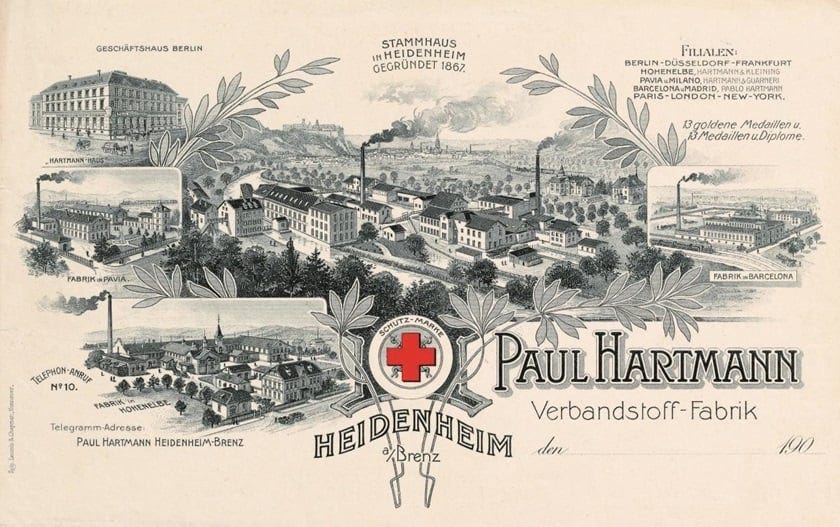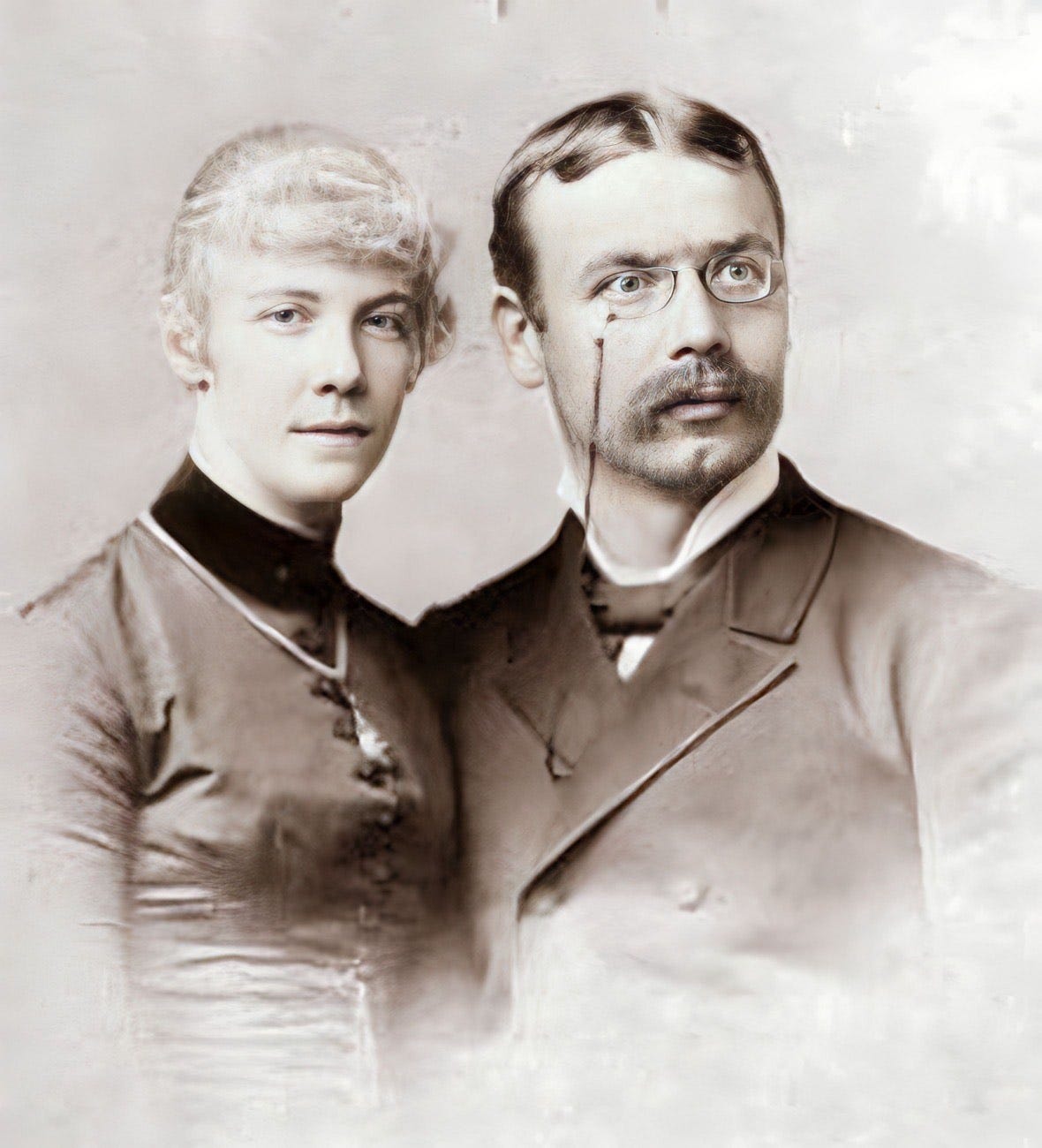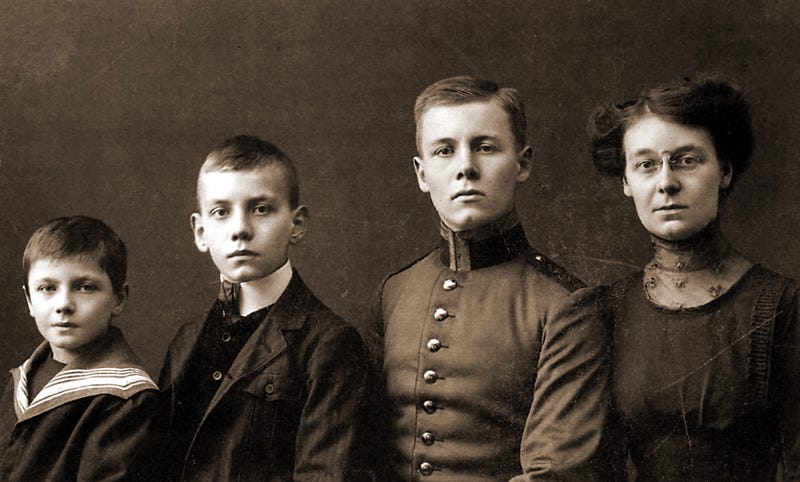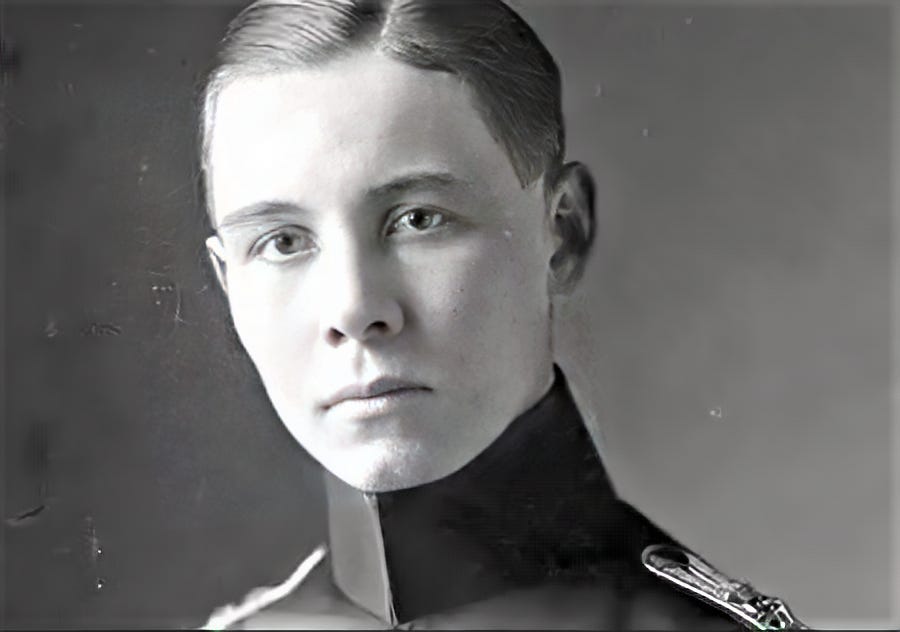Blood And Steel: The Saga Of Erwin Rommel. Part I
The Young Fox. November 15th, 1891 - July 19th, 1910
I have struggled to find a great deal of information on the early life of the Field-Marshal. Perhaps if I were able to interview Rommel’s widow Lucia in the way Desmond Young did, I would be able to ask more questions that appeal to the civilian as opposed to the soldier. By that I mean, Desmond Young was focused on the military operations and personal life of the mature military officer, whereas I would love to know more about the young Rommel she fell in love with in their youth. However, I can say without a doubt I am grateful for the information that we do have. It is not complete, but as St. Peter said,
“such as I have give I thee.”
As the sun broke over the horizon on November the 15th, 1891 it began to dispel the cool autumn air hanging over Heidenheim, a small town of about 9,000 souls next to the river Brenz, in the region of Swabia, in the Kingdom of Wurttemberg, within the young German Empire.

For most of Heidenheim’s residents, this day was just like any other. Many of them, preparing to go to church and start their day's activities. However, this day would be unusually significant for one couple, Erwin and Helena Rommel. You see Helena had been in labor in the early morning on the 15th and as the morning went on, her labor progressed to delivery. There at 12 o’clock noon, (one could only assume to the sound of church bells) a baby boy took his first breath. The proud parents would give him his father’s name, Erwin Johannes Eugen Rommel—the third child of Erwin and Helena, and eventual middle child of 5.
Young Rommel was baptized on the 17th of November, just two days after his birth, into the Lutheran Church. Although a Christian family it would be fair to call the Rommel family nominal Christians, at least in practice. Beyond the Spiritual being of the family, the Rommels absolutely lived up to the far more tangible stereotype of Wurttemberg, or as Desmond Young put it in his biography of Rommel “Rommel: The Desert Fox”,
“Wurttemberg was the home of common sense in Germany.”
Again, we find this similar quote from Ronald Lewis’ book “Rommel As Military Commander”,
His roots struck deep into the German provincial middle class. And—setting his military gifts apart—he remained a bourgeois until he died. This was in character : he was a Wurttemburger from Swabia—dour, self-reliant, unsophisticated.
David Fraiser writes in his biography on Rommel titled “Knight’s Cross” referencing the Swabians specifically,
“The Swabian, nevertheless, had and has recognized characteristics. He was stable, stolid, rather than emotional, in sometimes self-consciously dour contrast to his ebullient neighbor in Bavaria. He was careful with money, thorough, prudent. He was a loyal Wurttemburger, but felt himself superior to anybody else in the kingdom. Above all he had a common sense, a level-head, [and] shrewdness.”
Now, these are obvious cultural features in Germany as a whole, and even more so in the region of the Rommel family’s origin, but to take it a step further. The patriarch of the family (Erwin Rommel Sr.) was an extremely pragmatic individual, strict, and at times overbearing. Erwin Sr. was a peace-time veteran of the artillery, who would go on to retire at the rank of lieutenant. He was an accomplished mathematician and headmaster of the local secondary school who himself was the son of an accomplished mathematician and headmaster named Johan David Rommel. Erwin Sr. stood stoic and imposing as a model of discipline in the home, harsh characteristics that would not totally endear him to his family. However, with discipline comes dependability and the upright character that begets a positive public reputation. However, within his house, he could be extremely exasperating. As David Irving writes in his biography “The Trail Of The Fox”,
“He was harsh and overbearing and once provoked Erwin’s brother, Karl, into attacking him with a chair.”
Although the Rommel family had a history of being the exemplars of pragmatism and logical calculation, their home was not entirely cold and distant. For all of the weight that came with Erwin Sr.’s analytical mind, there was an equal measure of love and feeling found present in the heart of Helena. Mother Rommel’s maiden name was Helena Von Luz. She was the daughter of the respected Karl Von Luz a civil servant elected President of the local government of Württemberg, the “Regierungs-Prasident”, with that position came a level of notoriety, at least at the local level. Helena provided the warmth that kept the family functional in Erwin’s early years. Again, David Irving offers insight into the relations within the Rommel family in “The Trail Of The Fox”,
“All three brothers and their sister, Helene, were closer to their mother than to their father, and his early death was little loss to them.”
*Note: There does not seem to be a total consensus between the biographers regarding the family’s various views of, and degrees to which they felt concerning Erwin Rommel Sr. However, all biographers seem to agree that all of the Rommel children were closer to their mother Helena. The is a quote from Helene Rommel, Erwin Rommel’s older sister that would suggest the attitude of Erwin Sr. toward her at least was affectionate.
As time passed the young Rommel grew, but his youth was certainly no indication of the man he would become, save for a general curiosity, calm temperament, and child-like fearlessness. It would later be said by his sister Helene, of the General’s childhood in Desmond Young’s biography, “Rommel: The Desert Fox”,
“He was a very gentile and docile child, who took after his mother. Small for his age he had white skin and hair so pale that we called him the ‘white bear.’ He spoke very slowly and only after reflecting for a long time. He was very good-tempered and amiable and not afraid of anyone. When the other children used to run away from the chimney-sweeps, with their black faces and top hats, he would go up solemnly and shake hands with them. We had a very sunny childhood brought up by kind and affectionate parents who taught us their own love of nature. Before we went to school we used to play all day in the garden or in the fields or in the woods.”
David Irving mentions his lack of physical prowess in noting how he was a “sickly youth”. As we read more about his childhood it becomes obvious that he was not a physically impressive child, as David Fraiser writes in “Knight’s Cross”,
“As a child young Erwin, born on 15 of November 1891, was small, pale-faced, fair-haired, and blue-eyed.” … “he was, when young, unremarkable.”
This seemed to be all that the young Rommel was capable of. His youth would continue to affirm a rather unremarkable existence. I am certain that there was a level of disappointment present in Erwin Sr. concerning his eldest living son’s (Erwin Rommel had an older brother who died in childhood named Manfred) prospects for a good future. It was around this time in Rommel’s young life (1898) that Erwin Sr. would be offered a job in Aalen, Germany, as the director of the Realgymnasium (a non-classical secondary school) within that city. With Erwin Sr.’s acceptance of that offer came a relocation of the family to Aalen from their historic residence in Heidenheim.
Although the two towns are only 23.9 kilometers (14.8 miles) apart, the reality of life in Aalen couldn’t be more foreign to young Rommel. He went from playing in the fields and woods with his siblings all day to sitting alone under tutors attempting to prepare him for secondary school. Finally, being admitted to the secondary school only to struggle to complete the work. You see up to this point, Rommel lacked a solid formal education as there was no primary school in Aalen which left him behind the other students and struggling to catch up educationally, about which Desmond Young writes,
“he became even paler in the attempt to catch up, lost his appetite, and could not sleep.”
The stress of moving, adjusting to a new school, and frankly, growing up, caused him to become demoralized, inattentive, and lazy. Like many other young men in similar situations, he abandoned any academic effort and became disinterested in his schoolwork. This attitude caused him to fall even further from the pack and thus become the butt of the class. However, it was during this fall from academic grace that young Erwin would showcase a glimpse of his true potential. Outlined in an anecdote from Young’s Book “Rommel The Desert Fox” we get a good idea of the mind young Rommel was cultivating,
“If Rommel ever shows up a dictation without a mistake,” said the schoolmaster, “we will hire a band and go off for a day in the country.” Rommel sat up and promptly turned in a dictation without even a comma out of place. When the promised excursion did not come off, he relapsed into his usual indifference.”
It seemed, although he was a “dreamy little boy taking no interest in books or games and showing no sign of intense physical energy” as Young also wrote, there were deeper biological systems at play forging his brain into a formidable machine in spite of his efforts or rather lack thereof. This pattern would continue for the period of his childhood until his early adolescence when some internal switch was flipped, and that noble spirit that had been dormant was awakened inside of him.
It was here in Aalen that Erwin finally came into his own. Almost overnight the young man began to excel rapidly at mathematics showing evidence that he had inherited the same intellect that had been present in both his father and grandfather. He was filled with a physical energy that until this point in his life had been entirely absent, along with this transformation came new pursuits, namely cycling in the summers and skiing in the winters. With this metamorphosis also came a new level of maturity, “He lost his dreamy abstracted air and reverted to the type of Württemberg.” as Young wrote.
However, it was not until the year of 1906 that the ambitious mind of Rommel would be fully challenged. While with his close friend Keitel, (of no relation to Field-Marshall Wilhelm Keitel) he began to pursue the study of flight and aircraft. Desmond Young writes of the two young men building model airplanes together, and then a full-scale glider.
Note* Desmond Young writes that the glider had no successful flights, while David Irving affirms that Rommel would later say that it did fly a single time, although not very far. Irving also claims to have seen a photograph of the glider, all of my attempts to find said photo have been fruitless.
This interest in aerospace engineering stayed with both Rommel and Keitel through their teen years and finally culminated with Keitel deciding to become an engineer at the Zeppelin works at Friedrichshafen, Rommel also seems determined to follow his friend to Friedrichshafen. However, perhaps the greatest thing Erwin Sr. would do for his son was give him the nudge to join the military. although there was no particular military tradition in the Rommel family, his father was insistent. (I am inclined to think this may have been a sense of personal pride for his father. The same way that an infantryman in the U.S. Army would prefer his son to go into the Army rather than the Air Force.)
His father being an upstanding member of the community of some repute, and the husband of Helena Von Luz (the daughter of Karl Von Luz, the former president of the Württemberg government (now deceased)), was able to write a letter of commendation for his son Erwin that would carry more weight than that of an purely ordinary man, although he himself was not particularly special. He would go on to write that his son was “thrifty, reliable, and a good gymnast.” However, in spite of this praise, his application was rejected by both the artillery and army engineers. At this time I would imagine that young Rommel was wondering if he had pursued the wrong career. Yet when all may have seemed lost, the 124th Infantry Regiment (the 6th Württemberg Infantry) ordered him to report for medical examination in March of 1910.
In his book “The Trail Of The Fox”, David Irving includes a letter that Rommel penned for the Army to review,
Aalen, March 1910. - I was born on 15 November 1891 at Heidenhiem, on the Brenz as the second son of the schoolmaster Erwin Rommel and his wife Helene, nee Luz, both of the Protestant faith. As far as I can recall my early years passed very pleasant as I was able to romp around our yard and big garden all day long…
I was supposed to start primary school in the fall when I was seven ; but as my father was promoted to headmaster at Aalen that year and there is no primary school there, I had to acquire the necessary knowledge by private tuition in order to get into elementary school at Aalen. Two years later I entered the Latin School, and stayed there five years.
At about this time occurred the deaths of my dear maternal grandmother and my grandfather on my father’s side as well… In the fall vacation of 1907, I had the misfortune to break my right ankle jumping over a stream. But the foot was well set and it has healed satisfactorily, so that despite even the most strenuous activities I have never noticed any after effects. In the fall of 1908, I started in the fifth grade of the Royal Secondary Modern School at Gmund and a year later the sixth grade, to which I still belong. The subjects that have most attracted me of late are mathematics and science.
I have occupied my spare time with homework and reading, and apart from that with physical exercises like cycling, tennis, skating, rowing, skiing, etc. - Erwin Rommel.
Upon inspection, it was found that he had an inguinal hernia, but was healthy otherwise. His father arranged for him to have the surgery that would take care of his ailment. His father also agreed to pay for and maintain his son’s gear, uniform, etc. When this was done, young Rommel was ready to grow into the next stage of his life… the soldier.
Just six days after his operation, on July 19th, 1910 in the city of Weingarten, Erwin Rommel would join the 124th Infantry Regiment (the 6th Württemberg Infantry) as an “aspirant” meaning he would have to serve before being allowed to attend officer school at the Kriegsschule (War Academy). Thus began the saga of Erwin Rommel, ‘The Desert Fox’.







based